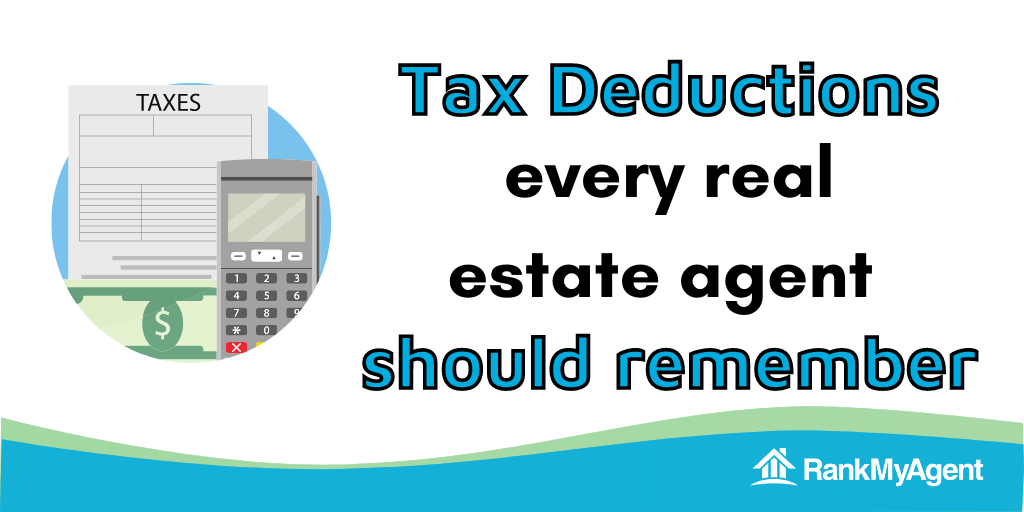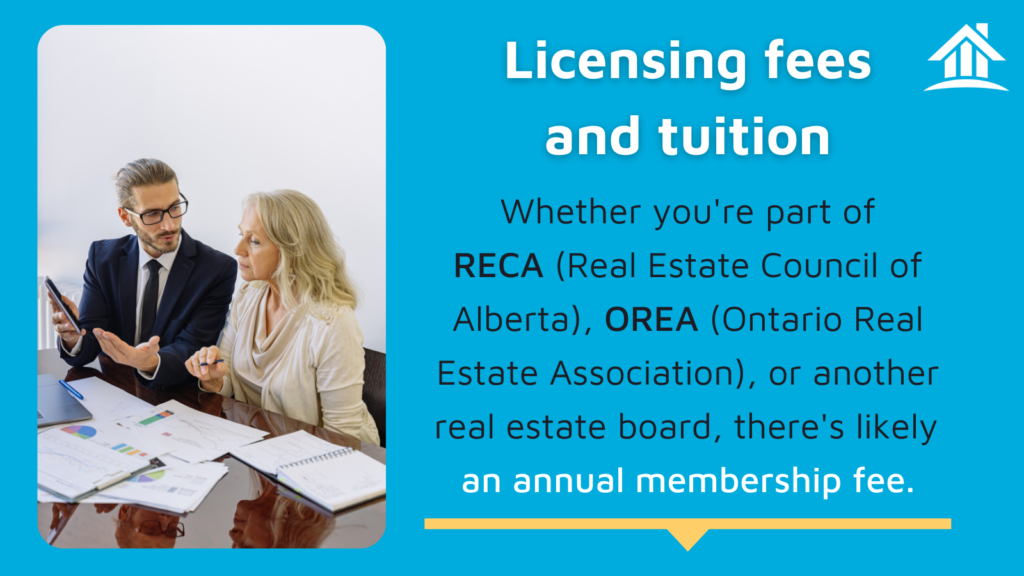
This is the season where everyone starts googling Canadian federal income tax rates, mortgage interest deductions, the Canadian Revenue Agency (“CRA”) and “accountants near you.” That is why we’ve compiled a list of a Canadian real estate agent’s necessary expenses to remember once taxes are due. But, of course, we aren’t accountants, so make sure to contact a CPA (Chartered Professional Accountant) to make sure you’re deducting every tax deduction you can deduct.
This fee grants you access to benefits like sales statistics and software and helps regulate your respective province or city agents. This fee is another deductible expense for your business.

Your board or other institutions may also provide courses to keep you up to date on the real estate industry. In some areas, these courses may be mandatory. It may be evident that these tuition expenses are tax-deductible, but less known is that there is more than one route to deduct these expenses.
First, you could choose to deduct your tuition costs as a tuition credit. This provides a tax credit — i.e., it reduces the amount of taxes you owe. Second, you could deduct these costs as a regular expense. This would provide a standard deduction against your revenues, which is then used to calculate the amount of taxes you owe. Again, it’s best to speak with your accountant to see which method is better for you.
Canadian real estate professionals know that grabbing dinner or lunch with a client or potential client is expected. It’s a good way to develop a business and make sure that you’re the person’s top choice when they need to sell or buy a property. Allowing all these meals to be fully deductible may result in too many deductions, so the government has compromised. 50% of all meal and entertainment expenses are tax-deductible. This is why it’s essential to keep all your restaurant receipts.
In an audit, it’s also important to note who you were with. Your receipts should also evidence that there were at least two people at this meal, or else the whole point of the deduction is pointless. So, if that receipt only has one entrée, it’s best not to try to deduct it. Additionally, a quick lunch by yourself is generally not tax-deductible, although the meal is related to your business’s busy schedule. Sometimes you develop a relationship with a client in which you are willing to lower your commission fee. In this case, the break you give, your commission rebate, is entirely tax-deductible – just be sure to keep the GST/HST collected on the full commission.

Agents commonly claim part of their home as a work-space-in-the-home expense. This allows you to write off portions of your home’s rent and maintenance costs as well as hydro, phone, internet, and property tax bills. However, you cannot deduct mortgage interest payments or capital cost allowance.
Due to the COVID-19 Pandemic, the Canadian Revenue Agency has changed their home office expense claim methods that are available for your 2020, 2021 and 2022 tax returns. You can use two methods. The first is the Temporary Flat Rate Method. If you worked more than 50% of the time from home for at least four consecutive weeks in 2020, 2021 or 2022, you could use this method. You can claim $2 a day for each day you worked from home, for a maximum of $500 for your 2021 and 2022 returns. This is up from the $400 limit in 2020. This method is used to claim home office expenses such as rent, electricity and internet. However, you may not be able to claim motor vehicle expenses if this method is used.
With the Temporary Flat Rate Method, your employer does not have to complete and sign Form T220, and you are not required to keep documents to support your claim. More money – less paperwork!
The second method is the Detailed Method. Here you can claim the actual amounts you paid for your home office but must support it with documentation and a signed Form T2200S and Form T2200 form your employer. This method involves determining the size and use of your workspace by differentiating how much of your home is used for personal reasons versus work. The formula is as follows:
Size of the workspace/Size of your home X 100 = your workspace as a % of your home
Someone using this deduction may also have to consider if multiple home residents share the workspace. For example, if you, your spouse and your adult offspring share a common work area, that will likely be relevant in claiming your deductions. With the Detailed method, employees can claim a portion of specific expenses related to the use of your workspace. For example, both salaried and commissioned employees can claim heat, water, rent and more. Commission employees can also claim home insurance, property taxes and the lease of specific electronic devices to earn their income that salaried employees cannot.
Once again, please seek the advice of a certified accountant to understand these deductions properly. A tax professional would best understand both methods, especially the exact method. Accountants and real estate brokers can be terrific friends!
A vehicle is one of a realtor’s most essential assets. It’s also a significant business expense. That’s why there are many car-related tax write-offs available to agents. The GST/HST, loans, and interest related to buying a car, repairs and maintenance, insurance, and, of course, gasoline, are all tax-deductible expenses for your business.
One caveat to expensing your vehicle is that you’re not always using it for work. You might pick up a client and show them different houses in a day. Then, you may head to the movies with your friends. In this situation, you’re likely using the same car.
The issue is that the CRA only allows you to expense car usage related to your business. To divide business-use and personal use, it is best to keep a logbook on the kilometres driven for business and personal. Apps such as Everlance or TripLog have digitized mileage tracking, turning the former cumbersome logbook into an easy-to-use app. Again, using the Temporary Flat Rate Method for home office expenses may inhibit your ability to write off car-related expenses.
The last expense we want to mention is your marketing and professional services costs. Like any business, the cost of direct mail flyers, a marketing agency running your digital ads, an accountant helping to file your taxes or a corporate lawyer you retain are all considered expenses on your business. These expenses are deductible in full against your revenues.
These are only some tax deductions to keep in mind for the upcoming tax season. Vehicle expenses, licensing and tuition fees, client-related expenses, home office, and marketing and professional services are just some of the most common costs that an agent will deduct from their income. It’s crucial to keep your expense receipts organized and filed. Notes on these expenses, such as car mileage and client-related expenses, are also important if you end up being audited. Again, make sure to speak to your accountant to take advantage of all the tax benefits available to you and other real estate agents. Accountants aren’t cheap, but they often save you more money in tax deductions than they cost you in fees.